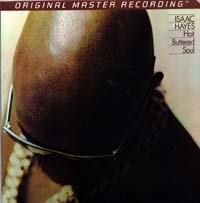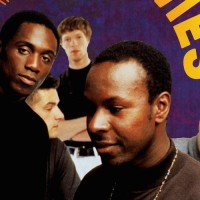It’s one of those Isaac Hayes shut-your-mouth moments. I’m talking about the news that Hayes, at 65, had passed.
He was a renaissance man in gold chains, a composer and arranger unafraid of style. He’d wear sunglasses the size of milk saucers while directing a room full of musicians on fiddles and bassoons.
 Hayes leaves this group of recordings marked by uncommon feeling, memorable (and lasting, remember the 18-minute long “By the Time I Get to Phoenix”?) grooves, and leap-to-your-feet arrangements. His was a fashion-forward influence on four-decades of kids — from hot-buttered soul to disco to gold-chained hip-hop to Chef on “South Park.”
Hayes leaves this group of recordings marked by uncommon feeling, memorable (and lasting, remember the 18-minute long “By the Time I Get to Phoenix”?) grooves, and leap-to-your-feet arrangements. His was a fashion-forward influence on four-decades of kids — from hot-buttered soul to disco to gold-chained hip-hop to Chef on “South Park.”
Hayes was an Oscar winner, a Grammy winner, a son of a sharecropper who became a Rock and Roll Hall of Famer, and a very bad dude. Back when bad meant good.
It’s no surprise, when you think about it, that Hayes wrote “Soul Man” for Sam and Dave. They should put it on his tombstone. He was a genetic marker for the music, and all of its many evolutions.
He opened the door for other smooth operators in R&B like Barry White and Curtis Mayfield, beginning with his 1967 solo debut, “Presenting Isaac Hayes,” then the multiplatinum follow-up “Hot Buttered Soul” in 1969.
His hip, relentless soundtrack work on “Shaft,” a 1971 Richard Roundtree vehicle (then a television series, then a film remake with Samuel L. Jackson), cemented Hayes’ position as cultural icon.
Harlem minister Dino Woodard called him “Black Moses” after Hayes became the first African American to win an Academy Award. Hayes then issued an album called “Black Moses,” which was No. 1 for seven weeks behind the hit “Never Can Say Goodbye.” His rhythmic, yet somehow sensual, solo work was definitive of its time, as American moved headlong into the fight for social justice. In a way, he opened the door for disco, too, with swirling orchestration and riveting wah-wah guitar. But that leaves aside Hayes’ very important early period.
 He had gotten his start at Memphis’ legendary integrated Stax Records in the early 1960s. There, working with writing partner David Porter (under the name ‘Soul Children’), Hayes helped construct some of that era’s most recognizable R&B tunes, too — including “When Something Is Wrong With My Baby,” the Grammy-winning “Soul Man,” and “Hold On, I’m Comin'” by Sam and Dave; “B-A-B-Y” by Carla Thomas; “Your Good Thing (Is About To End)” by Mable John; and “I Got to Love Somebody’s Baby” and “I Had a Dream” by Johnnie Taylor.
He had gotten his start at Memphis’ legendary integrated Stax Records in the early 1960s. There, working with writing partner David Porter (under the name ‘Soul Children’), Hayes helped construct some of that era’s most recognizable R&B tunes, too — including “When Something Is Wrong With My Baby,” the Grammy-winning “Soul Man,” and “Hold On, I’m Comin'” by Sam and Dave; “B-A-B-Y” by Carla Thomas; “Your Good Thing (Is About To End)” by Mable John; and “I Got to Love Somebody’s Baby” and “I Had a Dream” by Johnnie Taylor.
Few could claim a more sweeping influence on black music during either end of that turbulent decade.
Born on Aug. 20, 1942, in Covington, Tenn., Hayes’ parents died during his infancy. He was raised in the church by his grandparents; some of his first performances came there at age 5. Later, Hayes taught himself piano, organ and saxophone (from Lucian Coleman, brother of hard-bopper George Coleman) before moving to Memphis, where he performed with nascent soul groups like Sir Isaac and the Doo-Dads, the Teen Tones, and Sir Calvin and His Swinging Cats. His association with Stax Records came courtesy of a stint on sax with the label’s house band, the Mar-Keys. He later was a sideman on several sides by Otis Redding.
In this way, Hayes’ death represents a loss for music — but it’s also one for the world. His art works as a kind of soundtrack for change, and he lived that life: Hayes marched with Martin Luther King during the Civil Rights era, spoke early on the dangers of crack and the importance of literacy, then built an educational facility in Africa with his own money in his last decade.
After the glory days of “Shaft,” however, came the disintegration of Stax Records, and a series of underperforming records. (Notable exceptions included the mid-1970s albums “Chocolate Chip” and “Groove-a-Thon,” 1986’s updated single version of “Ike’s Rap,” and the tune “Chocolate Salty Balls,” which became a huge international hit in 1999 — reaching No. 1 on the British singles’ charts.)
Check out this live version of “Shaft” from the legendary early 1970s Wattstax concert, if for no other reason than the damn-right outfit:
Hayes briefly went into retirement from the music business — though not from public life: He did some acting, notably as the recurring character Rockfish on “The Rockford Files,” and as the villain in 1981’s “Escape From New York.” (This became a lingering passion, as Hayes appeared across a range of projects from “The A-Team” and Keenan Ivory Wayans’ comedy “I’m Gonna ‘Git You, Sucka” to Mel Brooks’ “Robin Hood: Men In Tights” and “Miami Vice.”)
Along the way, Hayes’ music would become a key element in the birth of the sampling culture around hip hop in the late 1970s and early 1980s — and he was reborn. In 1997, Hayes began voicing “Chef” — the soul-singing, school cook and devoted ladies man on “South Park.”
He subsequently appeared in a feature film based on that cartoon series, after recording “Two Cool Guys” on the “Beavis and Butt-Head Do America” movie soundtrack in 1996, and was part of Jackson’s “Shaft” remake in 2000. Later-career triumphs included work as a composer and arranger on Alicia Keys’ well-received debut “Songs in A Minor.”
Hayes had suffered a stroke in 2006, but remained busy before being found dead in his home beside a treadmill. Ironically, one of his more recent projects was a movie co-starring comedian Bernie Mac, who similarly passed away prematurely at 50 over the weekend from pnuemonia.
Initial reports suggested Hayes had suffered a simultaneous heart attack and stroke.
What we’ll miss? His soul, man.
- Nick DeRiso’s Best of 2015 (Rock + Pop): Death Cab for Cutie, Joe Jackson, Toto + Others - January 18, 2016
- Nick DeRiso’s Best of 2015 (Blues, Jazz + R&B): Boz Scaggs, Gavin Harrison, Alabama Shakes - January 10, 2016
- Nick DeRiso’s Best of 2015 (Reissues + Live): John Oates, Led Zeppelin, Yes, Faces + others - January 7, 2016



